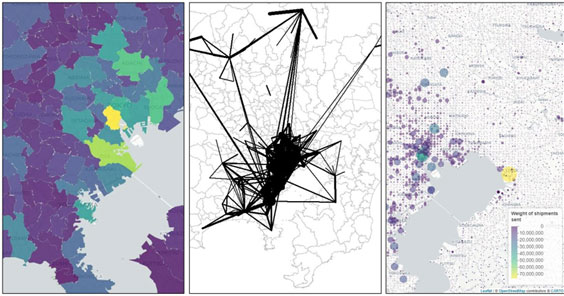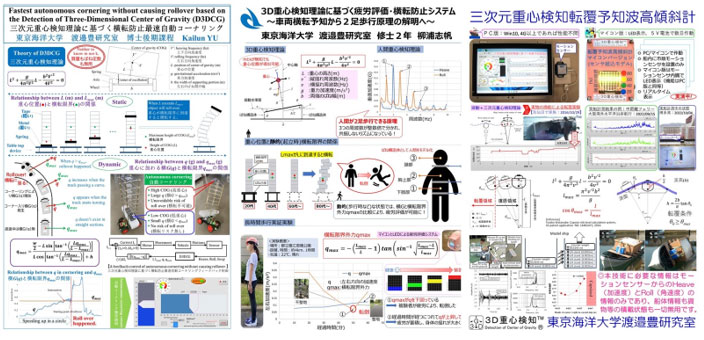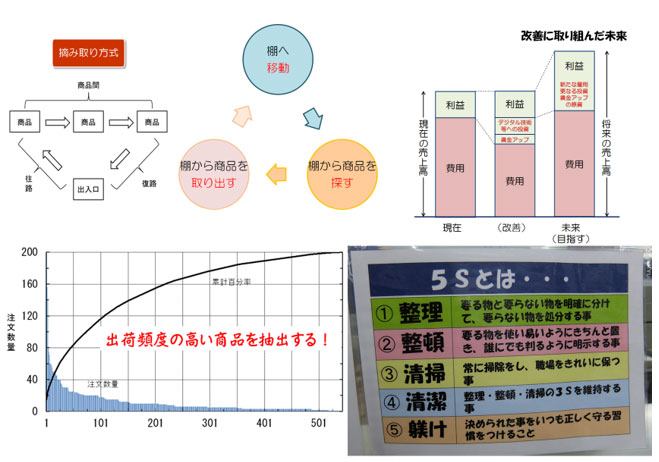Overview

The Logistics Systems Engineering covers the flow and transportation of goods from production to consumption. We study various fields related to logistics planning, design, operation management, and policy, such as multimodal transportation including sea, land, and air transportation; storage and distribution processing; optimization of logistics from a management engineering perspective; distribution information networking; and freight transport planning.
Lecture Methods
Students will learn the latest planning and design techniques and mathematical solutions for transportation and delivery systems, information systems, facility layout, and transportation systems. Students will also master planning and design techniques through case studies.
Attractiveness
With the advancement of globalization and information technology, logistics has been positioned as an important sector along with production and sales in the industrial world. There is no other university in Japan where students can learn about logistics engineering systematically. In collaboration with other fields such as logistics management, students can acquire both theoretical and practical knowledge.
Staff
| Instructor | Title | Research Area | Course Title | |
|---|---|---|---|---|
| Toshimasa ASO | Associate Professor | Logistics Information System | Logistics Information System, Experiments for Logistics Information Systems | |
| Mikio KUDO | Professor | Supply chain optimization | Supply chain optimization | |
| Hisayuki KUROKAWA | Professor | Logistics(improvement, design, etc.) | Logistics Design Experiments for Logistics Information Systems |
|
| Hitoshi KONNO | Professor | Mathematical physics, Representation theory |
Probability theory Complex analysis Mathematical science |
|
| Takanori SAKAI | Associate Professor | Urban freight, transportation planning | Advanced Transportation Planning Exercise of Regional Planning |
|
| Yoshiyuki SEKIGUCHI | Professor | Optimization Theory | Mathematical Informatics | |
| Tomoyuki TAKENAWA | Professor | Deep learning, Integrable systems |
Applied Analysis, Deep Learning |
|
| Hideki HASHIMOTO | Associate Professor | Combinatorial Optimization, Vehicle Routing Problem, Packing Problem | Logistics Engineering | |
| Tetsuro HYODO | Professor | Transportation planning, Transportation data science, Logistics facility planning | Advanced Transportation Planning. Exercise of Regional Planning | |
| Kazunori MATSUI | Assistant Professor | Numerical analysis for partial differential equations | Artificial Intelligence and Machine Learning | |
| Kohei MOTEGI | Associate Professor | Mathematical Physics, Quantum Integrable Systems |
Discrete Mathematics | |
| Minoru MORISHITA | Professor | Comparative Education, Border Studies in Education | Education and International Development | |
| Yutaka WATANABE | Professor | Detection of Three Dimensional Center of Gravity (D3DCG) | Security Management of Intermodal Transportation, Experiment of logistics and cargo systems | |
| Daisuke WATANABE | Professor | Logistics System Eng., Logistics Risk Eng., Geographic Information System | Spatial Information Engineering |
Selected Research Topics
Urban Freight Simulation (Associate Prof. Takanori Sakai)

We develop an urban and transportation simulator that incorporates the latest behavioral analysis modeling and data science methods, adapted to new data sources (GPS data, sensing data, camera data, delivery records, etc.), newly proposed measures and solutions, and planning needs.
Analysis of Logistics Big Data Using Geographic Information Systems (Prof. Daisuke Watanabe)

We conduct research on big data with information on the location of ships and vehicles in international and domestic logistics, using geographic information systems (GIS) to evaluate the environmental impact of ship navigation and the safety of large trucks on the road.
Improvement of Logistics Safety and Evaluation of Human Fatigue Using the Three-Dimensional Center of Gravity Detection Theory (Prof. Yutaka Watanabe)

The three-dimensional center-of-gravity detection theory can derive the position of the center of gravity when the mass (m) and spring constant (k) are unknown. This theory can be used to help prevent future automated trucks from overturning. It can also be used to prevent fishing vessels from capsizing. Recently, this theory has been proven to be applicable to humans and can help prevent fatigue and heat stroke. Our graduate students are leading these studies.
Improvement of Logistics Sites (Prof. Hisayuki Kurokawa)

We are conducting research to identify problems at logistics sites and to improve work productivity based on order data from retail stores and inventory data at distribution centers. We are also studying improvement measures to increase profitability and reduce environmental impact by evaluating the costs and carbon dioxide emissions associated with the work.